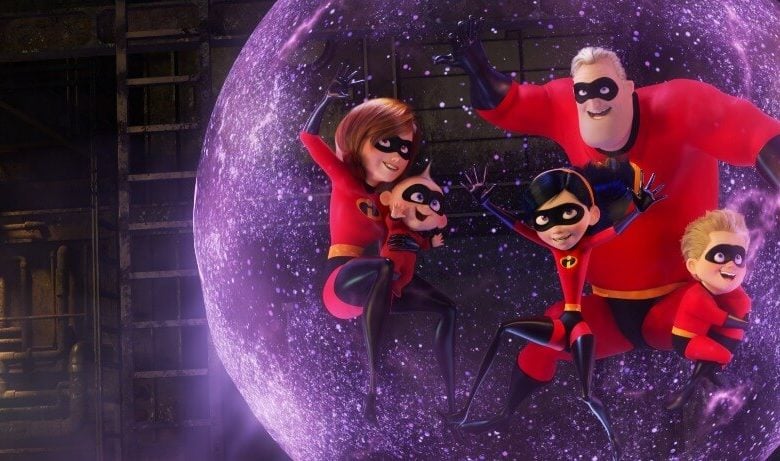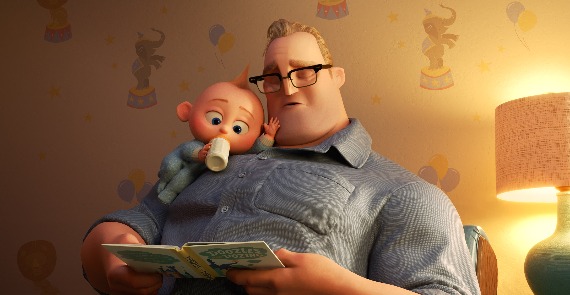
Slowly but surely Disney is getting woke.
That doesn’t mean the mega studio is going the full Social Justice route. Still, little by little woke elements are creeping into its film product.
Take the “Star Wars” franchise, which stopped cold during “The Last Jedi” to bash the rich and income inequality. Or the female droid in “Solo: A Star Wars Story” which prattled on about robot rights.
Even the recent smash “Black Panther” ended with an income redistribution flourish.
That brings us to “Incredibles 2,” the belated sequel to one of the very best slabs of popcorn entertainment of the modern age. It’s got all the Pixar bells and whistles – slick animation, relatable laughs and wowza action sequences.
It’s also got an overt female empowerment message you couldn’t miss if you closed both eyes.
We reunite with the superheroic family from the 2004 original, learning little has changed since last time. Superpower types are still forbidden from flexing their skills. That leaves Bob (Craig T. Nelson) and Helen (Holly Hunter) to bring their family up in a normal, suburban fashion.
This time, though, the government isn’t picking up the tab.
An overzealous entrepreneur and hopeless superhero fan (Bob Odenkirk) contacts the family with a plan to change the status quo. He thinks Helen’s Elastigirl persona is the perfect vehicle to convince citizens superheroes are worth all the bother. And he’ll install tiny cameras in her suit to show the world why unitard-clad heroes matter.
So while she goes back to work Bob gets to stay home with baby Jack-Jack, whose super powers are starting to appear. Oh, is this tyke talented, but the revelations aren’t as funny as the filmmakers would have you believe.
Naturally, a new menace appears before long, threatening far more than just the Incredible clan.
Like the first film, “Incredibles 2” has more on its mind than tasty quips from Samuel L. Jackson’s Frozone (who’s great again, naturally). The dialogue veers into territory sure to leave some kiddies behind. There’s talk of the rule of law and what it means, particularly if a law goes against your principles.
Once more Pixar shrewdly navigates the chasm between young and old viewers, but here the gap is more pronounced than ever. The problem? The topics aren’t that interesting. We’re debating the merits of superheroes in our midst again, an issue explored both in the first film and in the recent MCU saga “Captain America: Civil War.”
The woke element crops up early, as Bob transforms into Stay at Home Father Man. Naturally, in the true bumbling dad fashion, he quickly grows a five o’clock shadow and is overwhelmed by the task. To be fair, his infant can shape shift, blaze at random intervals and multiply himself.
Meanwhile, his better half is thriving while he does a quiet burn over being left behind.

It all feels … familiar. It’s impossible to recreate the bottled lightning of the first film, but making us go through an empowerment saga while rivisiting core themes from part one feels like a cheat.
“Leave the superhero stuff to the men?” Elastic Girl sniffs. Later, a young superheroine gets all worshippy with her — she’s a role model!
Later, when a bad guy gets busted young Violet (Sarah Vowell) scoffs. “He’s rich, he won’t get much prison time,” she says. Somebody’s been reading Noam Chomsky.
The best stories work on a more nuanced level, showcasing strong women without announcing, “hey, y’all, we’re about to do another segment on female empowerment!”
That all said, “Incredibles 2” is often funny, quickly paced and packed with satisfying superhero fights. One in particular is both dark and engrossing, reminding us what Pixar can still summon when push comes to shove. The film’s final act dials up the action, too, with most engaging results.
The movie’s visual palette is equally sly. We’re treated to a combination of modern trappings and ’50s era flourishes, from the old school camera flashes to the diners they visit. The TV sets featured here look straight out of the “Leave it to Beaver” era. It’s an odd but wonderful look, distinctive and bold,
A screen cap from the first film reveals the story is set in 1962, but the animators continually blur the lines between past and present.
The story also throws in some fresh riffs on the superhero genre. When Helen is given a drab new costume she complains, “I’m not all that dark and angsty,” a nice riff on how DC Comics heroes keep getting grittier.
Now, how about a Disney film make fun of its penchant for progressive bromides over pure storytelling bliss?
HiT or Miss: “Incredibles 2” couldn’t possible match the greatness of the original film. What we’re left with is more rock solid storytelling from Team Pixar with a dash of woke sensibility.
“TAG”
The new comedy “Tag” offers coal black laughs showcasing how friends will do just about anything to win.
Or…
“Tag” reveals that some adults refuse to grow up no matter what the calender says.
Or…
“Tag” is a rollicking action comedy that both expands on and mocks modern blockbusters.
Well, which is it? Inspired by a true story, “Tag” tries to be all of the above, while throwing in some awkwardly manipulative sentiment, too. It can’t have it all, so instead it’s a cop out on multiple levels. It’s mildly diverting, nothing more. A better script and tighter focus could have made it a keeper.
A group of elementary school friends somehow reached adulthood without growing apart. How did they do it? Partly by playing a once a year version of Tag that spans the entire month of May. No matter where they are at any given time, one of their chums might be lurking around the corner to tag them.
“You’re it!’
Only one of their members, Jerry (Jeremy Renner), has never been tagged. And he’s threatening to retire undefeated, a feat that cannot stand. So Hogan (Ed Helms), Bob (Jon Hamm), Chili (Jake Johnson) and Sable (Hannibal Buress) reunite to tag Jerry for the first and maybe last time.
Jerry’s impending nuptials give them the ripe opportunity to do just that. But there’s a reason Jerry remains undefeated. He’s like Jason Bourne on steroids, a fighting machine who can turn any household item into a weapon.
You can see the potential here, right? Only the screenplay (by Rob McKittrick and Mark Steilen) has so little on its mind its downright criminal.
Friendships? Growing older? The need for competition? A refusal to face reality? All credible themes waiting to be tapped. Nothing doing in “Tag.”
The film drags out tired tropes, from a random gay panic scene to Jerry’s fiance (Leslie Bibb) whose persona changes from scene to scene.
You can feel the film trying to be dark, bold and risky, but it’s heart isn’t in it. And, by the end, we’re handed a tear-jerker moment that is wildly unearned. And don’t bring the great Brian Dennehy back to the big screen if you’re going to use him for all of two screen minutes.
The soundtrack supercharges the comedy with mainstream rap (think Beastie Boys). The rockin’ soundtrack only underscores how little is going on elsewhere.
When it doubt, drop in a shart joke!
To be fair, the first slow-mo tag attack is brisk and clever. After that, it’s all diminishing returns from the film’s key selling point.
Our rag-tag group has been playing tag for 30 years, and they’ve gained barely any character development along the way. Chili is a stoner. Bob is a big shot executive. Sable is, well, the funniest member of the group, but that’s a low bar to clear.
Dennehy gets off lucky compared to what the movie has in store for Rashida Jones. She plays The Girl Who Got Away, the blank slate who once dated both Chili and Bob but now ping pongs between the two. It’s the kind of part they used to write for nameless stars who were pretty and, well, that was about it. Her subplot stops the movie cold repeatedly and is beneath the actress.
One sequence finds the players attempting to water board someone who might know where Jerry is lurking. “That’s a war crime … that’s not who we really are,” one of the Taggers says, echoing one of President Barack Obama’s stale memes.
Where did that come from? In a grab bag comedy like “Tag,” the lines come out of nowhere and quickly retreat to that same destination.
HiT or Miss: Action comedies deserve a good parody. Too bad “Tag” embraces the worst elements of them without adding anything fresh to the genre.
